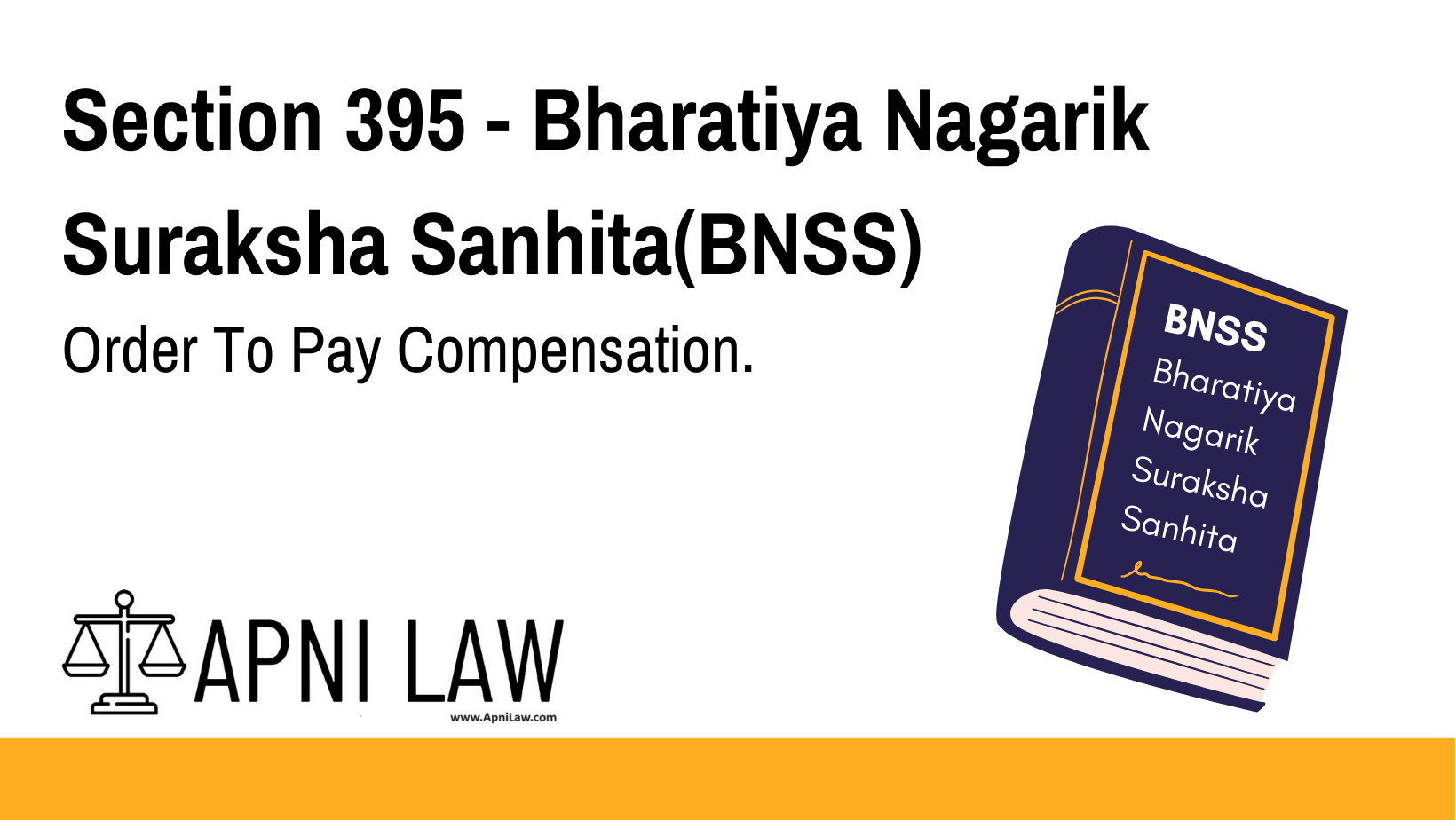Code: Section 395 BNSS
Compensation and Utilization of Fine Imposed by the Court
(1) When a Court imposes a sentence of fine or a sentence (including a sentence
of death) of which fine forms a part, the Court may, when passing judgment, order the whole
or any part of the fine recovered to be applied—
(a) in defraying the expenses properly incurred in the prosecution;
(b) in the payment to any person of compensation for any loss or injury caused
by the offence, when compensation is, in the opinion of the Court, recoverable by
such person in a Civil Court;
(c) when any person is convicted of any offence for having caused the death of
another person or of having abetted the commission of such an offence, in paying
compensation to the persons who are, under the Fatal Accidents Act, 1855, entitled to
recover damages from the person sentenced for the loss resulting to them from such
death;
(d) when any person is convicted of any offence which includes theft, criminal
misappropriation, criminal breach of trust, or cheating, or of having dishonestly
received or retained, or of having voluntarily assisted in disposing of, stolen property
knowing or having reason to believe the same to be stolen, in compensating any
bona fide purchaser of such property for the loss of the same if such property is
restored to the possession of the person entitled thereto.
(2) If the fine is imposed in a case which is subject to appeal, no such payment shall
be made before the period allowed for presenting the appeal has elapsed, or, if an appeal be
presented, before the decision of the appeal.
(3) When a Court imposes a sentence, of which fine does not form a part, the Court
may, when passing judgment, order the accused person to pay, by way of compensation,
such amount as may be specified in the order to the person who has suffered any loss or
injury by reason of the act for which the accused person has been so sentenced.
(4) An order under this section may also be made by an Appellate Court or by the
High Court or Court of Session when exercising its powers of revision.
(5) At the time of awarding compensation in any subsequent civil suit relating to the
same matter, the Court shall take into account any sum paid or recovered as compensation
under this section.
Explanation of Section 395 BNSS
Section 395 of the Bharatiya Nagarik Suraksha Sanhita (BNSS) provides the framework for compensating victims through the imposition of fines in criminal cases. It outlines how the court may order compensation to be paid to victims, the scope of compensation, and procedural safeguards for cases that are under appeal.
Key Points:
-
Application of Fine for Compensation:
When a fine is imposed, the Court may allocate the fine for:- Defraying the expenses incurred during prosecution.
- Paying compensation to the victim(s) for loss or injury, particularly when such compensation is recoverable in a Civil Court.
- In cases of death caused by the offense, compensation to those entitled under the Fatal Accidents Act, 1855.
- In cases of theft, misappropriation, or fraud, compensation to a bona fide purchaser if stolen property is restored.
-
Appeal Process and Compensation:
If the case is under appeal, compensation cannot be paid until the appeal period has elapsed, or the appeal is decided. -
Court’s Discretion in Non-Fine Cases:
In cases where a fine is not imposed, the Court may still order compensation to the victim by specifying an amount to be paid for the loss or injury caused by the offense. -
Appellate Court’s Role:
Appellate Courts, High Courts, or Courts of Session may also issue compensation orders when exercising revisionary powers. -
Impact on Civil Suits:
If a civil suit is later filed for compensation related to the same matter, the Court must account for any compensation already paid or recovered in the criminal case.
Illustration
Example 1: Compensation for Loss or Injury
A person convicted of causing grievous harm to another may be ordered by the Court to pay a fine. The Court may use part of the fine to compensate the victim for medical expenses or loss of income due to the injury. If the case is appealed, the compensation payment will be held off until the appeal is resolved.
Example 2: Compensation Under the Fatal Accidents Act
An individual convicted of manslaughter may be required to pay compensation to the family members of the deceased under the Fatal Accidents Act, 1855, as part of the sentence. This is to compensate for the financial loss suffered by the family due to the death.
Example 3: Theft and Compensation to Bona Fide Purchaser
An individual convicted of stealing property may be ordered to pay compensation to a bona fide purchaser who lost the property, if the property is returned to its rightful owner.
Common Questions and Answers on Section 395 BNSS
1. What is the purpose of ordering compensation under this section?
- Answer: The purpose is to ensure that victims of crimes, including those harmed or financially impacted, receive compensation through the criminal justice process, and not just a criminal punishment.
2. Can compensation be paid before the appeal process is concluded?
- Answer: No, if the fine is part of a case under appeal, compensation cannot be paid until the appeal period expires or the appeal is decided.
3. How does the Court decide the amount of compensation?
- Answer: The amount of compensation is decided based on the nature of the offense, the harm caused, and in cases like theft, the loss incurred by the affected party.
4. Does the compensation affect subsequent civil cases?
- Answer: Yes, any compensation paid or recovered under this section must be considered when awarding compensation in any related civil suit.
5. Can compensation be ordered in every case?
- Answer: No, compensation is specifically ordered when the Court deems it appropriate, typically in cases involving significant harm, theft, or loss.
Conclusion
Section 395 BNSS ensures that victims of crimes are compensated for their loss or injury by enabling the Court to allocate part of the fine imposed on the offender for victim compensation. This provision strengthens the victim-centric approach within the criminal justice system, ensuring that financial recovery can be sought through the legal process, with safeguards in place to manage appeals and subsequent civil suits.
For legal advice on compensation claims, visit ApniLaw today! 🚀








